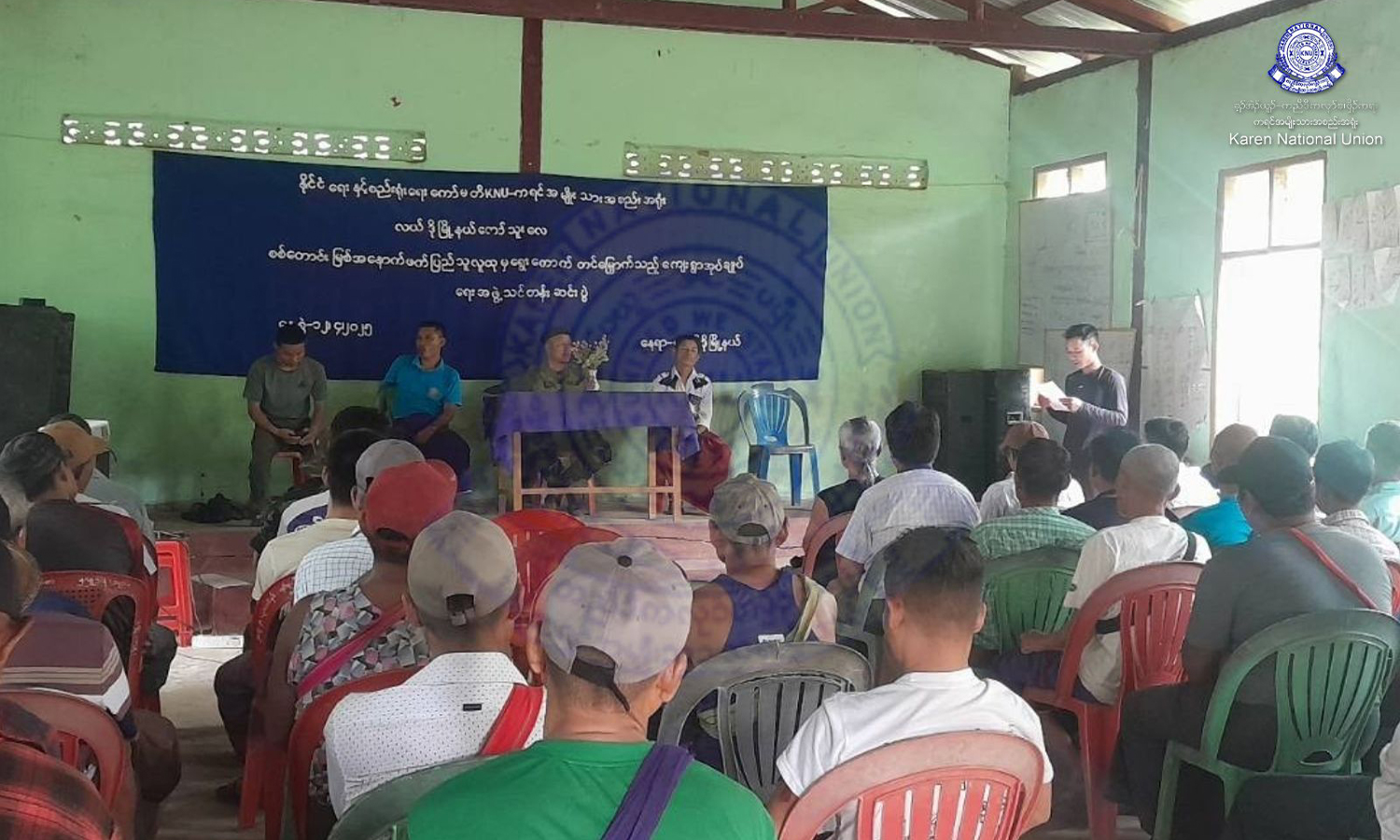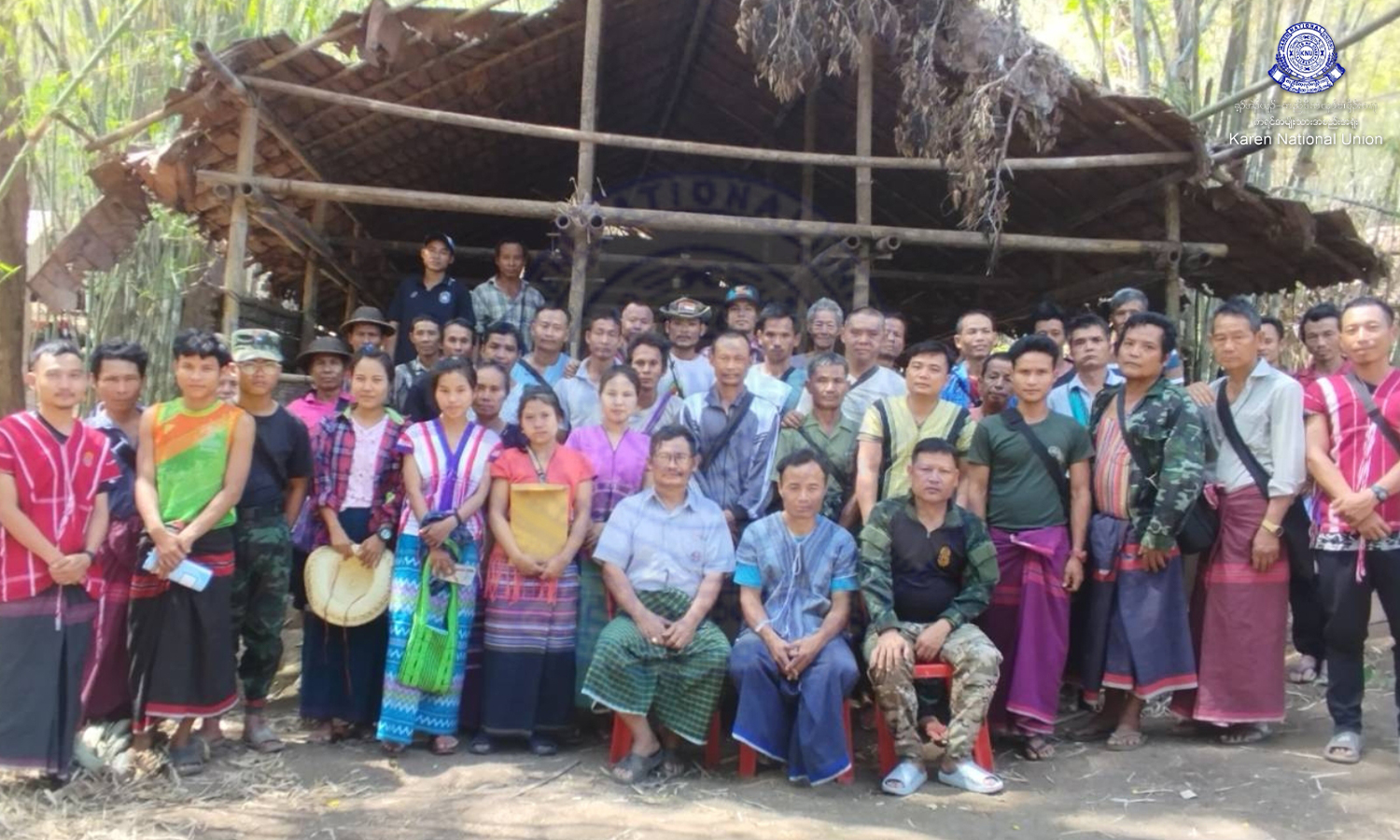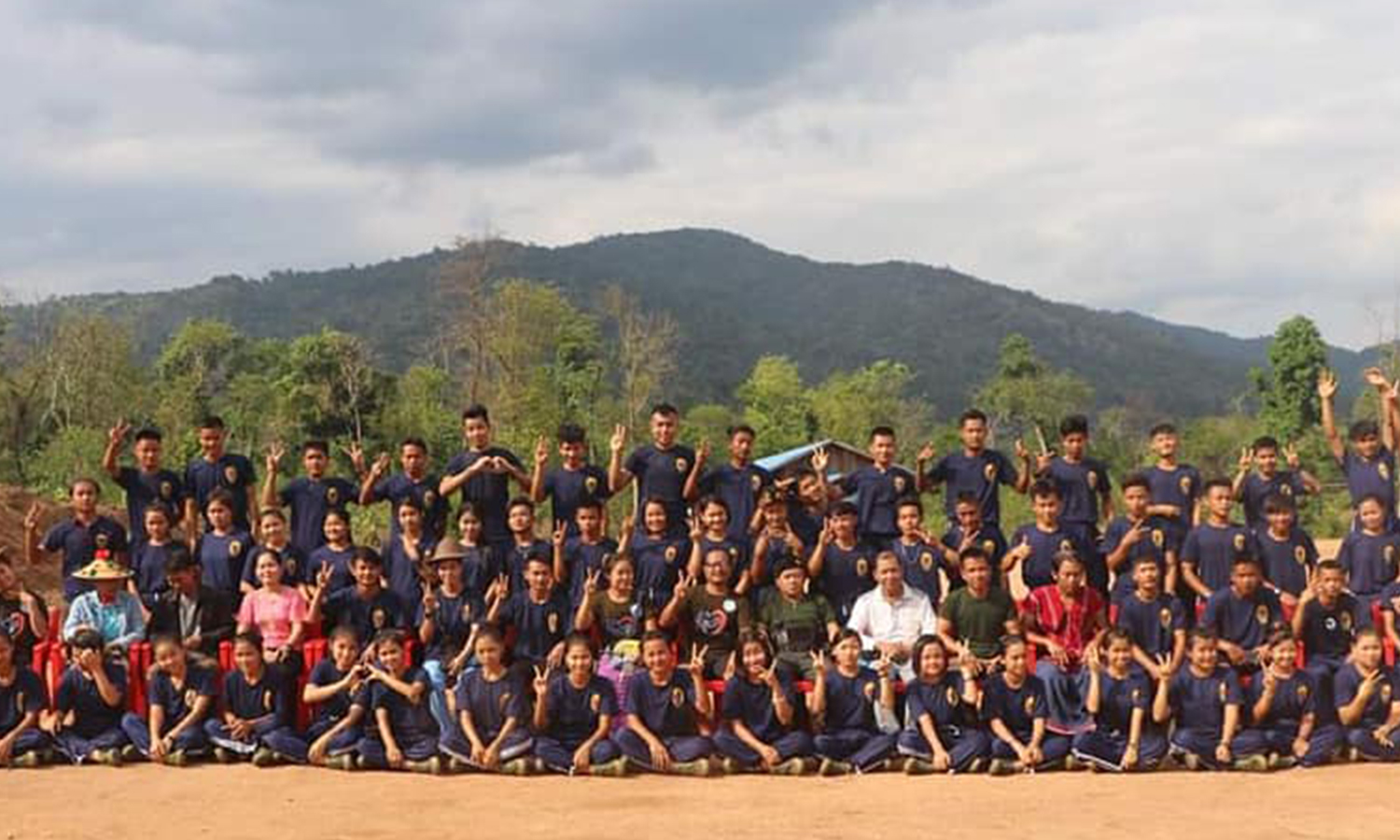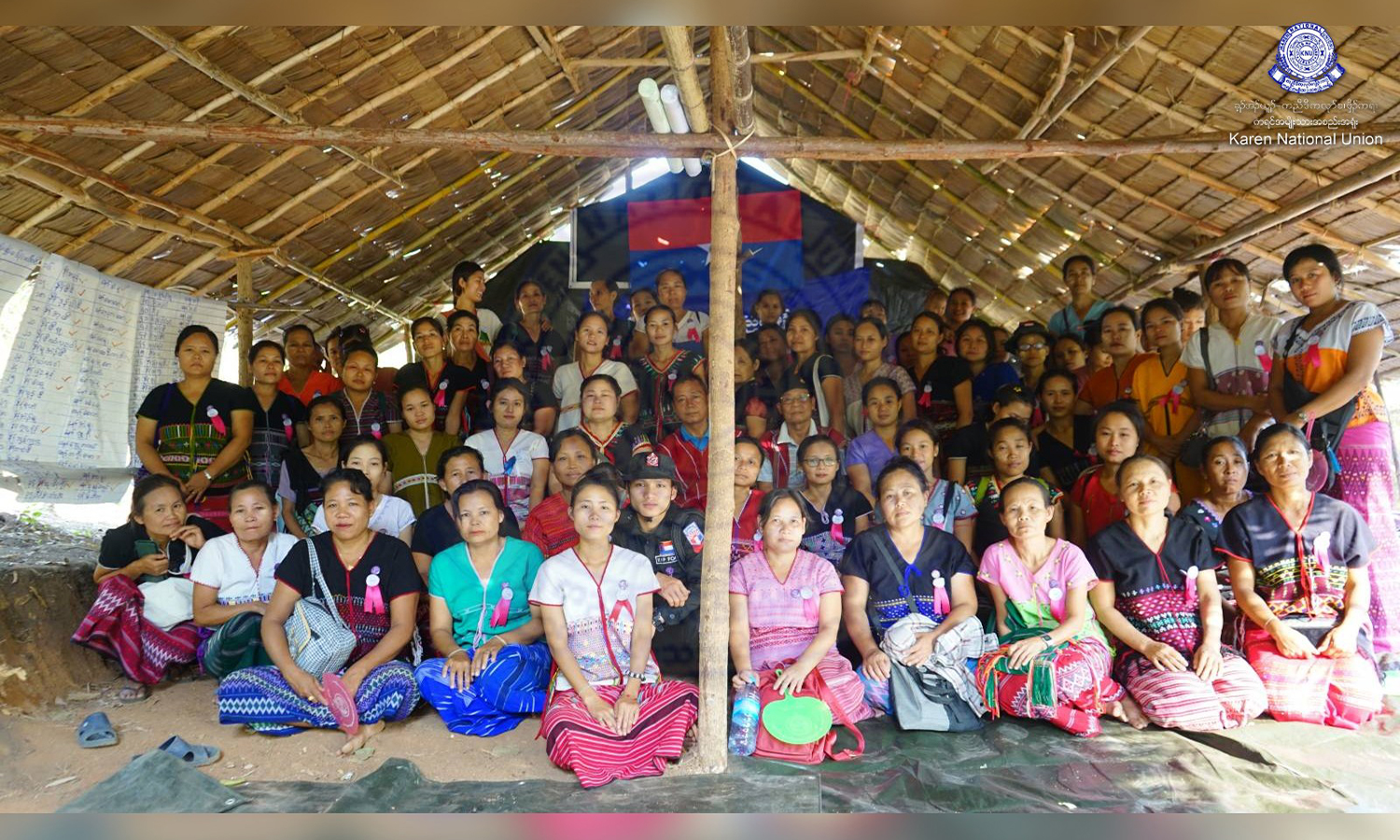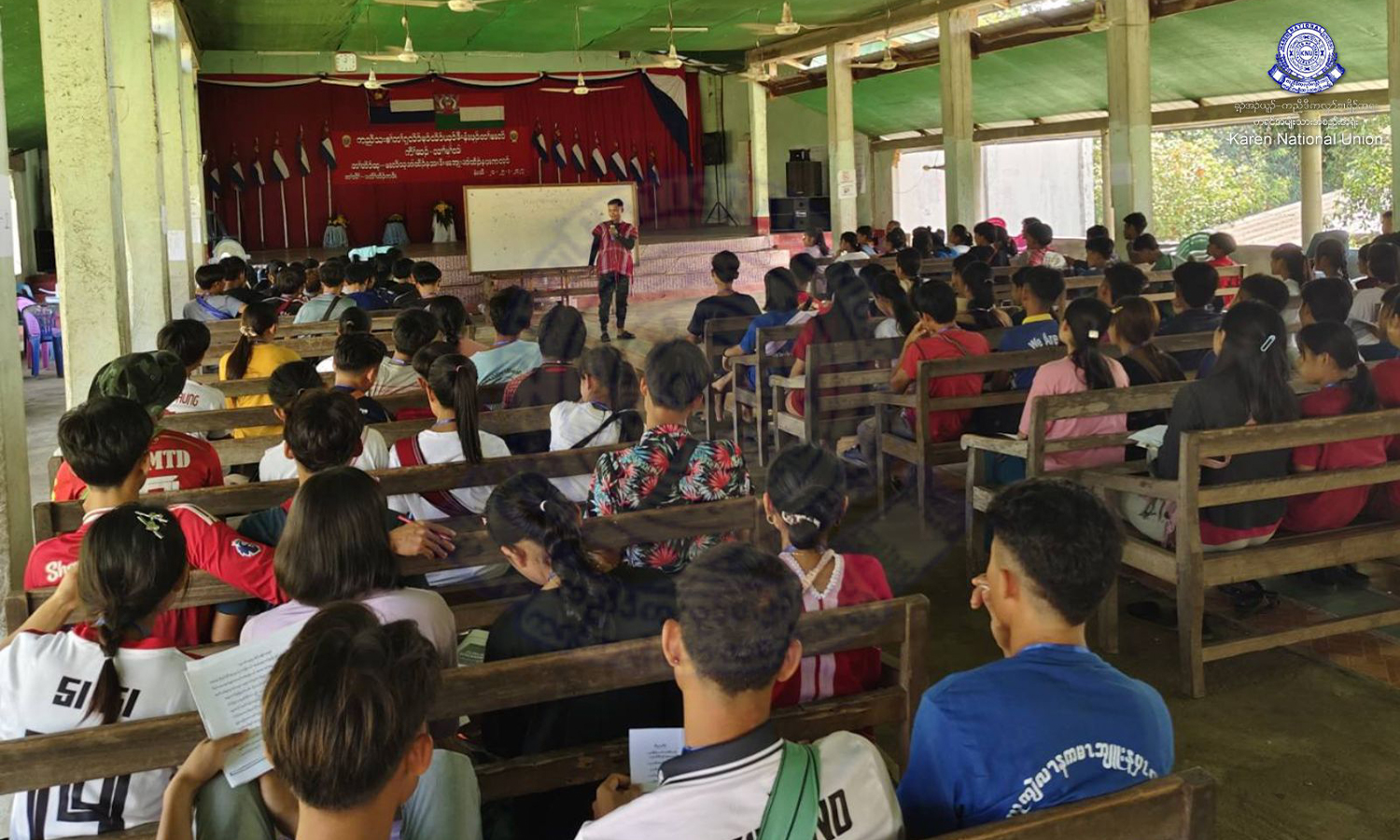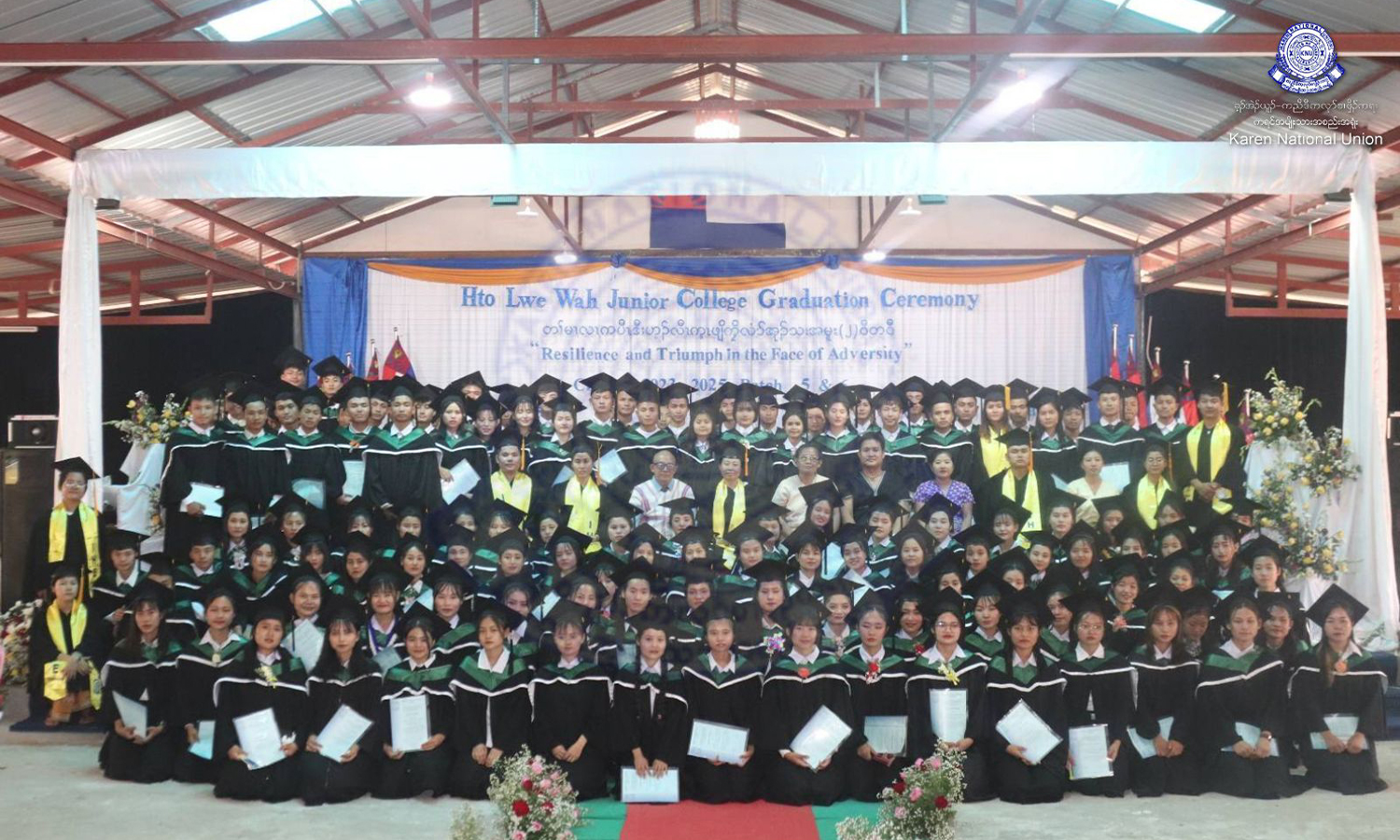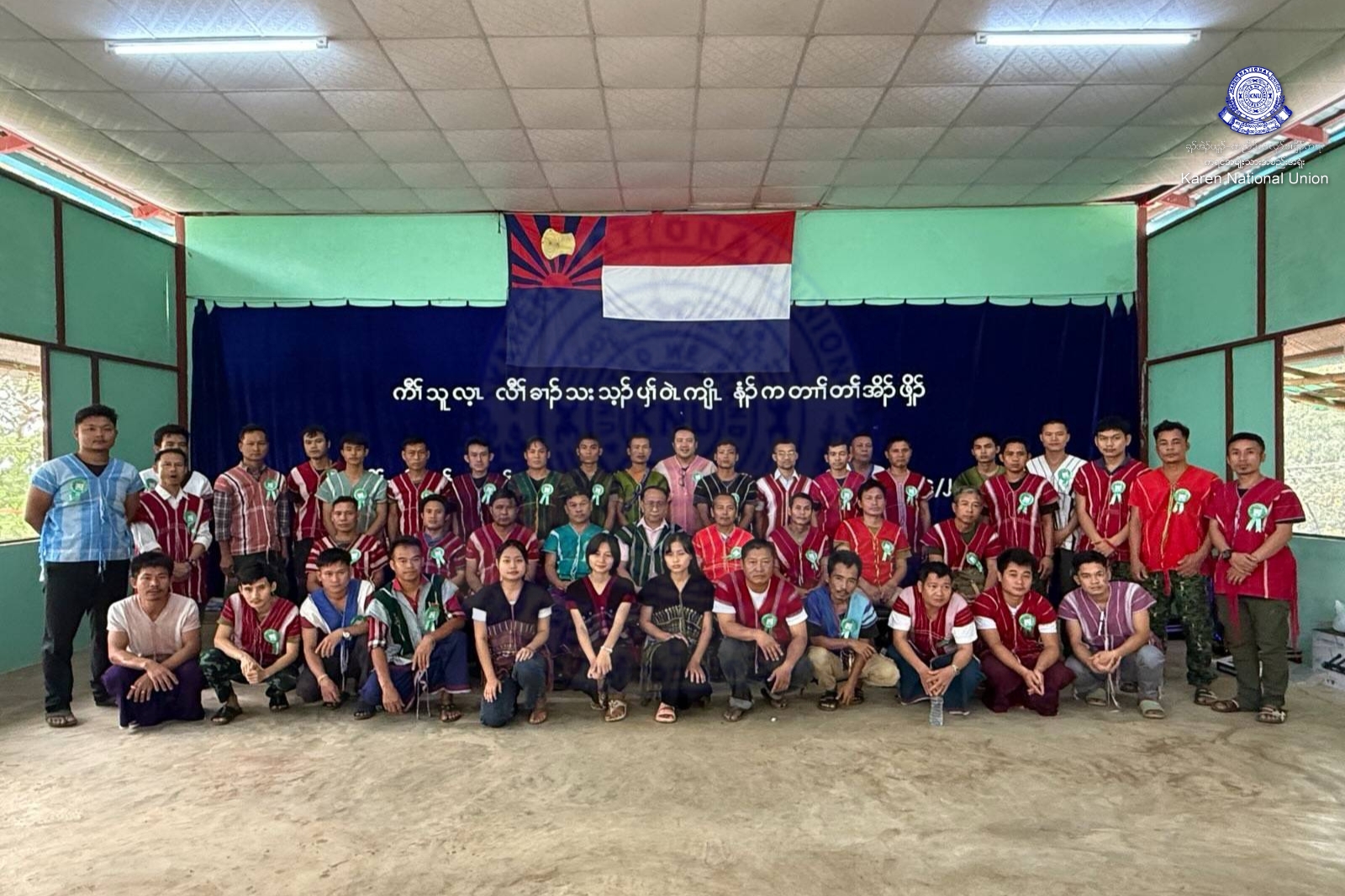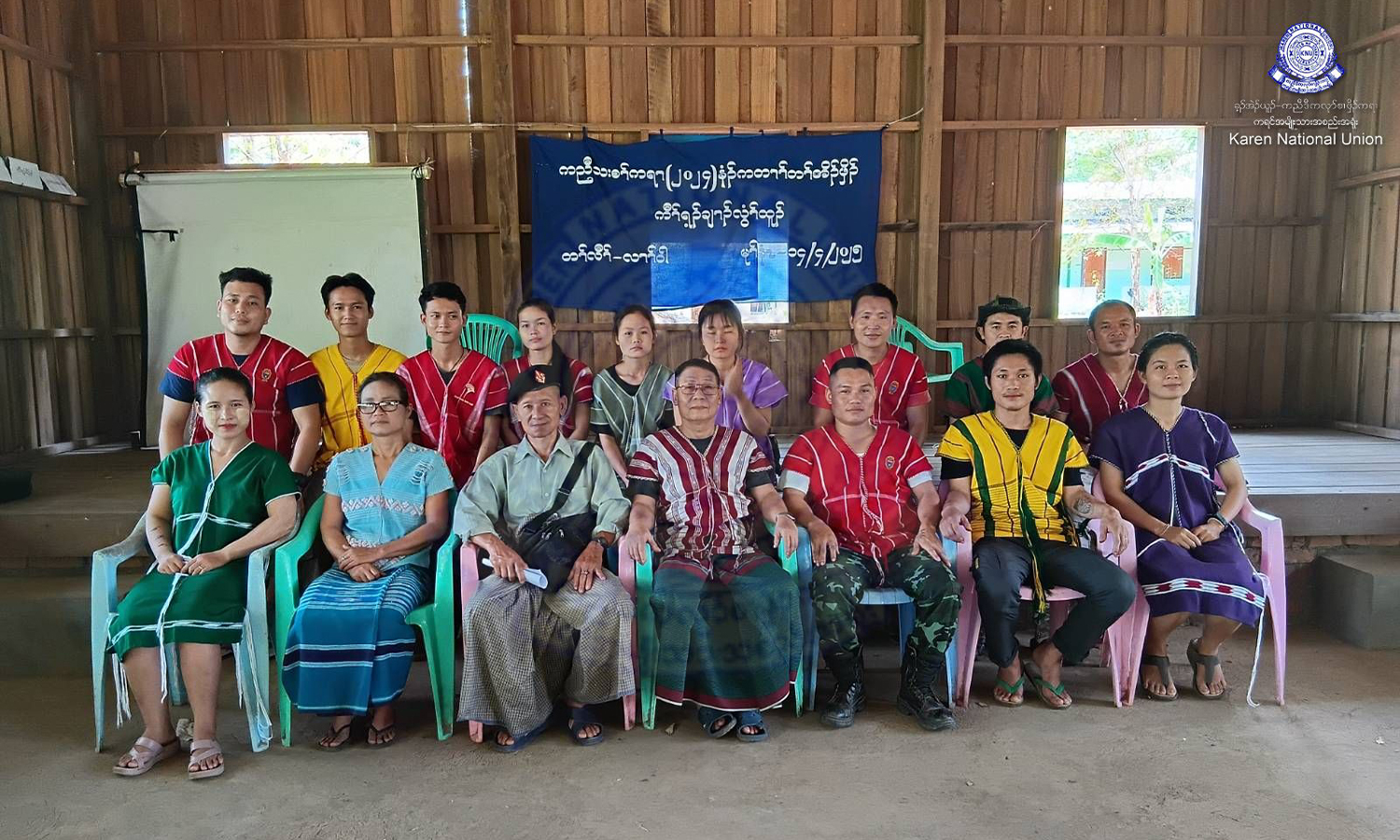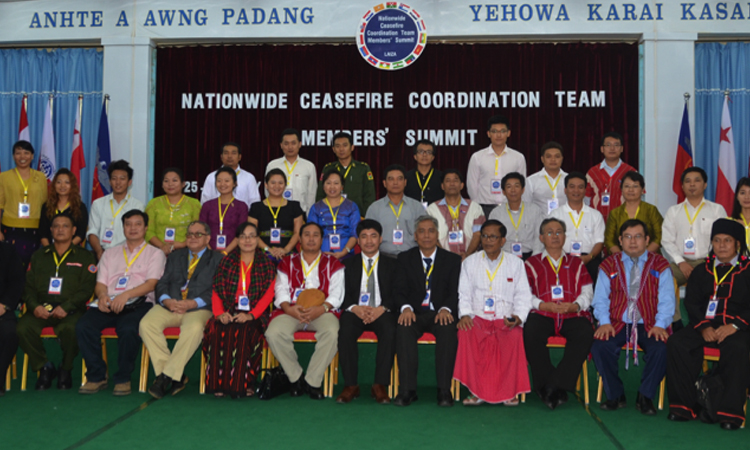 တၢ်မုၥ်တၢ်ခုၣ်တၢ်လဲၤကျဲ
တၢ်မုၥ်တၢ်ခုၣ်တၢ်လဲၤကျဲ
NCCT Members Summit - July 2014
Laiza's Spirit for Nationwide Ceasefire Agreement
A 9-member Karen National Union delegation led by President General Mutu Sae Poe, left KNU Supreme Headquarters on July 19, 2014 to participate at the Ethnic Armed Resistance Organisations Conference held in Laiza, Kachin Independence Organisation (KIO) Headquarters from July 24-26, 2014.
The KNU delegation was chosen by Central Standing Committee members at the recent CSC meeting (14-16 July) in Law Khee Lar, Hpa-an District, Karen State. The delegation included KNU Chairman General Saw Mutu Sae Poe, General Secretary P’doh Saw Kwe Htoo Win, Central Executive Members P’doh Saw Tah Doh Moo and P’doh Mahn Nyein Maung, Standing Committee Members Major General Saw Isaac and Major Saw Tamla Thaw, President Secretary Saw Tamula, General Secretary's Assistant Saw Nimrod and President Security Personal Saw Kyi Moo.
The KNU delegation arrived at Yangon in the late evening of July 19 where they spent the night before continuing their journey to Myitkyina the following day. They arrived at Myitkyina Airport the afternoon of 20 July where they were warmly welcomed by the Kachin community leaders and the Kachin Peace Creation Group.
On July 21, 2014 around 1:30 pm, they departed from Myitkyina and travelled to Laiza, KIO Headquarters arriving around 4 pm. The KNU delegation passed through Burmese army camps, checkpoints and abandoned villages before entering KIO controlled areas. The fighting between KIO and the Burmese army has greatly affected the civilians who are in the middle of the conflict.
When the KNU delegation entered into the main street of Laiza city, on route to the reception hall, a long line of KIA soldiers, civilians, students and children sang, shouted and waved ethnic armed organizations' flags, warmly welcoming the delegations. "May the Ethnic Armed Conference succeed and peace in the ethnic areas now" and "May the spirit of Laiza be with you" were the slogans that echoed from the street to the main reception hall.
When entering the reception hall, high-ranking leaders of the KIO and KIA received the delegations at a formal reception ceremony. P’doh Saw Kwe Htoo Win while introducing the KNU delegation at the reception said, "I am very honoured to receive a warm welcome from the KIO leaders and the Kachin people. I hope the upcoming conference will achieve good results for us all".
Welcome Dinner for NCCT Members
Today, Burma's ethnic senior leaders, who form the Nationwide Ceasefire Coordination Team (NCCT), arrived from across Burma at Laiza to attend the NCCT Members' Summit on July 24 – 26, 2014.
The 16 NCCT Members are Arakan Army (AA), Arakan Liberation Party (ALP), Arakan National Council (ANC), Chin National Front (CNF), Democratic Karen Benevolence Army (DKBA), Kachin Independence Organisation (KIO), Karen National Union (KNU), Karen National Union/ Karen National Liberation Army (Peace Council) – KNU/KNLA PC, Karenni National Progressive Party (KNPP), Lahu Democratic Union (LDU), Myanmar National Democracy Alliance Army (MNDAA), New Mon State Party (NMSP), Pa-O National Liberation Organization (PNLO), Palaung State Liberation Front/ Taang National Liberation Army (PSLF/TNLA), Shan State Progressive Party Shan State Army (SSPP/SSA), and Wa National Organisation (WNO).
Later at 5 pm, the NCCT members were invited to attend a welcome dinner hosted by Kachin Independence Organization (KIO). KIO senior leaders including the Chairman, Vice-Chairman and Commander in Chief joined the welcome dinner.
Dr. La Ja General Secretary of KIO, speaking on behalf of the Chairman of KIO, in his opening dinner address to the ethnic leaders said, “KIO hopes the summit which starts tomorrow will bring fruitful results”. He also encouraged the ethnic leaders to openly discuss their differences in order to resolve ethnic causes peacefully in the Peace Process of Burma.
The NCCT Members Summit will begin on the 24 July and is expected to last for few days.
Note: On the first day of the summit (24/7/2014), which started at 9.00am until 4.00pm, NCCT discussed setting up a Managing Committee for the summit. The result was the formation of a (16) members Managing Committee comprising of one person from each of the 16 ethnic armed organizations, led by KNU Chairman General Saw Mutu Sae Poe. The Managing Committee will manage the smooth running of the meeting; give decisions on the preparatory agenda of the meeting proposed by NCCT, and will select the rotary chairperson who will chair the meetings. The decision making process during the meeting will use consensus through consultation on the issues raised.
The summit officially started on the 25 July and will be chaired by Chairman Zaung Karaung of the KIO; vice-chairs are Khaing Soe Naing Aung from ALP and Dr. Za Hlei Thang from CNF.
KNU Chairman's Opening Speech
Minglabah. Let me give my best wishes to all the leaders of the Ethnic Nationality Armed Groups, representatives and observers attending this NCCT Members Summit, to be happy and healthy both physically and spiritually. At this important time, I’m very glad and honoured to meet all the leaders at this summit.
Dear leaders,
To fulfill the original aim of the Karen National Union that is to solve the political problems through peaceful political means, the Karen National Union is collectively working to gain a nationwide ceasefire agreement in this country. In addition, as this is the national cause for the entire nation, we have to negotiate within our organisation, with other organisations, as well as, our alliances and our enemies. We have to keep focus the whole time and work on the process, like the one who is walking on the tightrope.
Dear leaders,
To solve the political problems through peaceful political means is a political struggle. In this struggle, we have to base on dialogue and negotiation. In the negotiations we cannot be based on subjectivism and we need to be cautious and avoid dogmatism. As we need to ‘put ourselves in their shoes’ we need to construct realistic work and the right mechanism. In addition, as the nature of negotiation, we have to compromise and even though we do not get full percent of what we want, a good result is that both will not lose but will have a win-win situation.
We must be aware that today’s political landscape gives us a time limit. The ceasefire and the political dialogue resulting in constitutional change, to establish a federal union, which is the aspiration of all the ethnic nationalities, is the emerging condition we experience at the present time. In order to achieve the aspiration of our ethnic nationalities we need to consider the leaders who want reform within the state, the supporting groups and the active participation of the people, international interests, and the real situation of geo-politics. To add more, be aware that today’s Peace Process is not the same as the previous ceasefire dialogues held in the history of Burma. Therefore, each and every of our organisation while maintain its status quo needs to work forcibly and bravely for the emergence of a better process. From this stage, we need to consider seriously how to implement in order to achieve the political transformation that we desire. Both sides need to overcome existing doubts and mistrust between us and through creating trust building mechanisms and following together.
To overcome all the difficulties, the unity of all the ethnic nationalities is inevitably necessity. But speaking about unity only as a slogan, time after time, is not workable. We must consider the basic principle and model to be able to achieve unity. For example, let say – in establishing a federal union giving common benefits, we must sign the ceasefire agreement that can begin the political dialogue. During this process to establish a federal union the implementation must be done through cooperation. Because of this cooperation we will have mutual understanding, and the result will be unity. In fact, unity is a fruitful result of working together.
The NCCT that was formed by the ethnic nationalities armed groups has been working on the nationwide ceasefire for more than eight months to achieve the fruitful result of unity. However no concrete result is yet obtained. Nobody can say definitely how long it will take to discuss (1) vocabularies, (2) contents and, (3) the concept of the draft that is being negotiated. What we can say exactly is that a long-term stagnation without progress cannot be good for all. Especially the political forces within the country, political parties and people who wish to amend the constitution are waiting for us. In this important meeting for national reconciliation, we need the emergence of a good result to be able to continue further.
Hence, each organisation must maintain their preliminary agreement obtained. At the same time, if we select one out of many options, we will need time for discussion between ethnic nationalities, government, military, and parliament to consult, calculate and decide. Nevertheless, these are the means that we can try. I want you to think about three specific options out of many. You can consider and chose one out of the three or a combination.
Agree on the articles of the nationwide ceasefire agreement, which is negotiating now that is based on the principle of equality. Sign this agreement, and continue to the political dialogue. But the agreement concerning separation of troops, interim matters, independent neutral monitoring mechanisms and military code of conduct must also be obtained.
The challenge for our unity that is, “Those who are ready can sign, but the rest shall sign later” is very dangerous. Therefore, no need to elaborate on it.
Negotiating for the nationwide ceasefire agreement, and trying to agree on the framework for political dialogue are processes that should be started simultaneously.
It is important that one should not make hindrance to stop this Peace Process. In order to be able to continue the Peace Process, political dialogue must be made simultaneously with the ceasefire process. This shall bring a positive result to all concerned people, all political parties and all civil society organisations. It is necessary to overcome all hindrances. Because all have a strong desire to begin the political dialogue.
In order to fulfill the aspiration of all parties concerned, let me mention one of the quotations from Nelson Mandela. He said, “If you want to make peace with your enemy, you have to work with your enemy. Then your enemy shall become your partner”. Therefore, be aware that all ethnic nationalities armed organisations have continuously demanded to resolve the political problems through political means in our history and, let us start this political dialogue and process with our enemy, which has fought with us for more than sixty years.
In conclusion, let us all be mindful that the political time and tide waits for no man. So let us negotiate and make an active and positive participation to establish a new country bringing a new culture that values unity in diversity.
Special Envoy Vijay Nambiar, delivers personal message from UN Secretary-General Ban Ki-moon, at NCCT Members Summit
"I have followed closely the developments with respect to the peace process in Myanmar and my Special Adviser Vijay Nambiar has been keeping me informed of its progress. I fully share his faith in the commitment and determination that have guided the efforts of all the stakeholders in this process. The progress in negotiations during the past year and more has involved a wide variety of stakeholders. They have now come together to provide genuine grounds for optimism and hope of a decisive end to over six decades of conflict and for the launching of a new dialogue for national reconciliation.
Today, you are on the threshold of a unique opportunity to negotiate a successful and sustainable nationwide ceasefire and start a political dialogue between the national government and the various ethnic armed groups for power sharing within a unified Myanmar.
I recognize that this juncture has not been attained without difficulty. All sides have had to address challenges, make compromises as well as concessions. However, you have been able to show by your actions that you are animated by the larger object of reflecting the aspirations of the people you represent and not by any narrow or parochial political or economic agenda.
By embracing a nationwide ceasefire and a political dialogue process, all sides will agree to put aside the legacy of mistrust and suspicion and embark on a new era of mutual confidence and cooperation between the diverse ethnic groups and communities of the nation and to work in a unified way for a common destiny for Myanmar. You will agree to work as one for the nation and for its people.
Such a prospect was unforeseeable even a few years back. It has required of a leap of faith on the part of many of your leaders. There will no doubt be many problems you will face in the future. There will also be differences you will have to resolve. But, every successful peace process reaches a point where those involved need to take such a leap of faith. I hope you have taken it today.
At this critical juncture I would like to commend your leadership at all levels and to reiterate the strong support and commitment of the United Nations in taking forward your efforts for their fullest realization. I am also happy to convey my personal felicitation and support to your peace efforts".
NCCT Members Summit Concludes With A Solidifying Of Ethnic Cooperation in Laiza
The Nationwide Ceasefire Coordination Team (NCCT) Members' Summit that started on July 25 in the headquarters of Kachin Independence Organisation's Laiza successfully concluded today, solidifying a united ethnic cooperation for further negotiations with the Union government.
The main purpose of the Summit was to review, analyse, amend and finalize the second drafted single text nationwide ceasefire agreement that was jointly drafted by NCCT and Union Peacemaking Working Committee (UPWC).
NCCT received mandate from the first Ethnic Armed Organisations' Conference in Laiza, and the second conference in Law Khee Lar, Karen State to negotiate with UPWC a nationwide ceasefire agreement. They reached a juncture, which needed their senior leaders to meet together and give directions to move forward, in order to achieve a nationwide ceasefire and then continue political dialogue.
The Summit thoroughly discussed the second draft single text document and reached 10-point policy decisions that include building a federal union based on democracy, equality and self-determination. The Summit renewed the mandate for NCCT to negotiate with the government to achieve a nationwide ceasefire. Ethnic senior leaders were astute in choosing new approaches, which in some points were compromising some terminologies but adding the definition of terms in order to negotiate with the government.
The three Karen armed groups; KNU, DKBA and KPC that participated at the Summit, again showed their solidarity by sitting together and discussing the 10 point policy decisions that was raised on the final day of the Summit. Other ethnic nationalities such as Arakan organizations follow suit. The cooperation of the Karen armed groups are important and longing by the Karen public.
KNU Chairman General Saw Mutu Sae Poe who was also nominated Chairman of the Management Committee for this Summit, in his opening speech on the second day mentioned the importance of ethnic cooperation, policy guideline and principles of mutual understanding for achieving a nationwide ceasefire and starting political dialogue. His speech surprisingly matched the message from the UN Secretary-General Mr. Ban Ki-Moon whose message was delivered by his special envoy to Burma/Myanmar Mr. Vijay Nambiar, two days later at the summit.
The United Nations Special Envoy Mr. Vijay Nambiar and Tang Ying, the assistant to China’s newly appointed Asian affairs representative also attended the last two days of the summit. Mr. Nambiar gave a brief speech and delivered UN Secretary-General Ban Ki-Moon message to the Summit leaders. "By embracing a nationwide ceasefire and a political dialogue process, all sides will agree to put aside the legacy of mistrust and suspicion and embark on a new era of mutual confidence and cooperation between the diverse ethnic groups and communities of the nation and to work in a unified way for a common destiny for Burma/Myanmar".
Non NCCT Members, the Restoration Council for Shan State (RCSS) and, All Burma Student Democratic Front (ABSDF) participated as observers at the Summit.
This new dawn for a stronger and unified NCCT, and with the hope of wiliness and compromise from the government side, reaching a nationwide ceasefire agreement and starting political dialogue is near to achieve.
The slogans of "Peace in the ethnic areas now" that we heard from the Kachin people, who welcomed ethnic senior leaders when they enter Laiza on July 21, can only bare fruits when all sides agree to put aside their differences and embark on a new era of mutual understanding and cooperation. The time is now.




